#Revisionism
Text
No, Jimmy.
A people’s indigeneity does not expire.
This is a universal fact that applies to all indigenous peoples.
Whether it’s the Irish, the Basques, Jews, Palestinians, Circassians, Assyrians, Armenians, Yazidis, Mandaeans, Sami people, Mari people (as in the Mari El), Rapa Nui, Māori, Ainu people, Ryukyuan peoples (Okinawa), Tibetan people or any others.
Try telling them that and see how they react!
What other lies are you gonna start spouting?
Are you gonna say that Ireland has always been British? Or that the Armenian genocide didn’t happen?
Because neither of those are true either.
#dougie rambles#personal stuff#indigeneity#vent post#political crap#fucking morons#fucking hell#erasure#denialism#revisionism#indigenous#ireland#armenia#armenian genocide#fuck’s sake#bad history#shit takes#anti revisionism#anti denialism#historical revisionism#whitewashing#leftism#anti imperialism#decolonization
63 notes
·
View notes
Text
By: Andrew Doyle
Published: Apr 18, 2024
“Why do you think the giraffe has a long neck?” says the naturalist Philip Henry Gosse to his son Edmund while he tucks him up into bed. “Does it have a long neck so that it can eat the leaves at the top of the tree? Or does it eat the leaves at the top of the tree because it has a long neck?”
“Does it matter?” says Edmund.
“A great deal, my son.”
This exchange is taken from Dennis Potter’s wonderful television play Where Adam Stood (1976), a loose adaptation of Edmund Gosse’s Father and Son (1907). Gosse’s book must rank among the very best of autobiographies. It is his account of being raised by his father Philip, one of Darwin’s close contemporaries, a man whose faith in the Bible was so fervent that the revelations of natural selection almost destroyed him.
The question about the giraffes is Potter’s invention, but it adroitly captures the profound inner struggle of this scientist who had devoted his life to a belief-system that was suddenly falling apart. It wasn’t just a matter of changing his mind as new evidence emerged, because the proposition that the earth’s age could be numbered in the billions rather than the thousands was not something that his faith could accommodate. The stumbling block was the Bible, a point that Edmund is quick to acknowledge in his book:
“My Father’s attitude towards the theory of natural selection was critical in his career, and oddly enough, it exercised an immense influence on my own experience as a child. Let it be admitted at once, mournful as the admission is, that every instinct in his intelligence went out at first to greet the new light. It had hardly done so, when a recollection of the opening chapter of Genesis checked it at the outset. He consulted with Carpenter, a great investigator, but one who was fully as incapable as himself of remodelling his ideas with regard to the old, accepted hypotheses. They both determined, on various grounds, to have nothing to do with the terrible theory, but to hold steadily to the law of the fixity of species.”
Philip Gosse had an instinct for scientific enquiry, but the new discoveries simply could not be reconciled with his holy text. His whole being was invested in the Biblical truth, and to cast that in doubt would be to undermine the crux of his being. To admit that he might have been wrong, in this particular instance, would be a form of spiritual death.
Both Gosse’s memoir and Potter’s dramatisation grapple with what Peter Boghossian and James Lindsay (in their book How to Have Impossible Conversations) call an “identity quake”, the “emotional reaction that follows from having one’s core values disrupted”. Their point is that when arguing with those who see the world in an entirely different way, we must be sensitive to the ways in which certain ideas constitute an aspect of our sense of self. In such circumstances, to dispense with a cherished viewpoint can be as traumatic as losing a limb.
The concept of identity quakes helps us to understand the extreme political tribalism of our times. It isn’t simply that the left disagrees with the right, but that to be “left-wing” has become integral to self-conceptualisation. How often have we seen “#FBPE” or “anti-Tory” in social media bios? These aren’t simply political affiliations; they are defining aspects of these people’s lives. This is also why so many online disputes seem to be untethered from reason; many are following a set of rules established by their “side”, not thinking for themselves. When it comes to fealty to the cause, truth becomes irrelevant. We are no longer dealing with disputants in an argument, but individuals who occupy entirely different epistemological frameworks.
Since the publication of the Cass Review, we have seen countless examples of this kind of phenomena. Even faced with the evidence that “gender-affirming” care is unsafe for children, those whose identity has been cultivated in the gender wars will find it almost impossible to accept the truth. Trans rights activists have insisted that “gender identity” is a reality, and their “allies” have been the most strident of all on this point. As an essentially supernatural belief, it should come as no surprise that it has been insisted on with such vigour, and that those who have attempted to challenge this view have been bullied and demonised as heretics.
Consider the reaction from Novara Media, a left-wing independent media company, which once published some tips on how to deceive a doctor into prescribing cross-sex hormones. Novara has claimed that “within hours of publication” the Cass Review had been “torn to shreds”. Like all ideologues, they are invested in a creed, and it just so happens that the conviction that “gender identity” is innate and fixed (and simultaneously infinitely fluid) has become a firm dogma of the identity-obsessed intersectional cult.
Identity quakes will be all the more seismic within a movement whose members have elevated “identity” itself to hallowed status. When tax expert Maya Forstater sued her former employers for discrimination due to her gender-critical beliefs in 2019, one of the company’s representatives, Luke Easley, made a revealing declaration during the hearing. “Identity is reality,” he said, “without identity there’s just a corpse”.
This sentiment encapsulates the kind of magical thinking that lies at the core of the creed. So while it becomes increasingly obvious that gender identity ideology is a reactionary force that represents a direct threat to the rights of women and gay people, there will be many who simply will not be able to admit it. In Easley’s terms, if their entire identity is based on a lie, only “a corpse” remains. From this perspective, to abandon one’s worldview is tantamount to suicide.
This determination to hold fast to one’s views, even when the evidence mounts up against them, is known as “belief perseverance”. It is a natural form of psychological self-defence. After all, there is a lot at stake for those who have supported and enabled the Tavistock Clinic and groups like Mermaids and Stonewall. Many of the cheerleaders have encouraged the transitioning of children, sometimes their own. What we have known for years has now been confirmed: many of these young people will have been autistic, or will have simply grown up to be gay. For people to admit that they supported the sterilisation of some of the most vulnerable in society would be to face a terrible reality.
This idea was summarised in parliament on Monday by Victoria Atkins, Secretary of State for Health and Social Care. Addressing Labour MP Wes Streeting, she said:
“I welcome all those who have changed their minds about this critical issue. In order to move forward and get on with the vital work that Dr Cass recommends, we need more people to face up to the truth, no matter how uncomfortable that makes them feel. I hope the honourable gentleman has the humility to understand that the ideology that he and his colleagues espoused was part of the problem. He talked about the culture and the toxicity of the debate. Does he understand the hurt that he caused to people when he told them to ‘just get over it’? Does he know that when he and his friends on the left spent the last decade crying ‘culture wars’ when legitimate concerns were raised created an atmosphere of intimidation, with the impact on the workforce that he rightly described?”
youtube
It remains to be seen whether those politicians who failed to grapple with the implications of gender identity ideology, and who mindlessly accepted the misleading rhetoric of Stonewall and its allies, will have the humility to admit that they were wrong. Many culpable celebrities have been choosing to remain silent in recent days, while others have opted for outright denial. On the question of puberty blockers and their harm to children, television presenter Kirstie Allsop has made the remarkable claim that “it is, and always has been possible to debate these things and those saying there was no debate are wrong”. The concept of “no debate” was official Stonewall policy for many years, and has been a mantra for many within the trans activist movement. To suggest that there have been no attempts to stifle discussion on this subject can only be ignorance, mendacity or a remarkably acute form of amnesia.
Of course, the stakes could hardly be higher. We are dealing with complacency and ideological capture that had resulted in the sterilisation and castration of healthy young people. It is, without a doubt, one of the biggest medical scandals of our time. It is entirely understandable that those who have supported such terrible actions would enter a state of denial. And so we must also be sensitive to those who are now strong enough to admit that they were mistaken.
But we also need to prepare ourselves for the inevitable doubling down. There are those whose psyche cannot withstand the kind of identity quake that Philip Henry Gosse once suffered. His solution was to write a book explaining why God had left evidence of natural selection. It was called Omphalos (1857) – the Greek word for “navel” – and his thesis was that since Adam had no mother, his navel was merely an addition to generate the illusion of past that did not exist. The fossils that were being discovered in the ground were therefore no different than the rings in the first trees in the Garden of Eden. They weren’t evidence of age, but rather part of God’s poetical vision.
Some of the revisionism and excuses from gender ideologues are likely to be even more elaborate. They have invested too much in their fantasies to give up without a fight.
==
As gender identity ideology falls apart, we need to pay attention to who is working to fix the mistakes they made, who is doubling down, and who is remaining silent.
#Andrew Doyle#revisionism#gender ideology#gender identity ideology#queer theory#Cass report#Cass review#intersectional feminism#gender cult#medical scandal#medical mutilation#medical corruption#ideological capture#ideological corruption#religion is a mental illness
40 notes
·
View notes
Text
Both opportunism and dogmatism arrise from a common source: nihilistic subculturalism. Once you give up on the possibility of victory, revolutionary politics can only be driven by personal goals--professional advancement, or clique membership. It no longer matters if you fail to attack capitalism or the people reject you. Political struggle becomes ritualized.
20 notes
·
View notes
Text
Today marks the 51st anniversary of the enactment of US-backed Martial Law in the Philippines by the late president/dictator Ferdinand Marcos Sr. One of the darkest days in the history of the country and spanning for about a decade, many human rights violations, killings, tortures, enforced disappearances, military and police abuse of power, economic downfall, environmental damages, famine, media blackout (except for those approved of the regime), and overall corruption. All for the so called "fight against communist insurgency." The Marcos family and their allies basically lived like royalites while the Filipino people suffered.
Ferdinand Emmanuel Edralin Marcos Sr. served as the 10th president of the Philippines for 20 years from 1965 to 1986. He ruled under martial law for nine years from 1972 until 1981 but kept most of his martial law powers until he was deposed in 1986. Under his regime, violence was used to enforce civil control over the citizens of the Philippines, resulting in thousands of documented cases of human rights violations.
But many people to this day continue to refer to this time as the "Golden Age" of the country, that life was good for "law abiding citizens." Here are some numbers that debunks this popular myth.
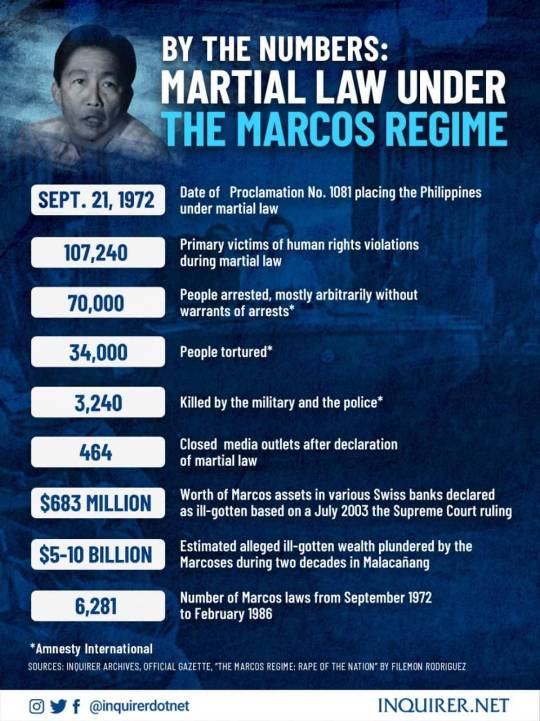
Data from the image:
Sept. 21, 1972: Date of Proclamation No. 1081 placing the Philippines under martial law.
49: Persons from the Greater Manila Area immediately arrested on Sept. 22, 1972, by the military, among them three senators, three congressmen, two provincial governors, four delegates to the Constitutional Convention and eight newsmen. First on the list was opposition senator and main political rival Benigno “Ninoy” Aquino Jr.
Sept. 23, 1972: Press Secretary Francisco Tatad announces the imposition of martial law and reads the Marcos proclamation in a nationwide televised broadcast. Marcos himself went on air at 7 p.m. to formally announce the proclamation
12-4 a.m. – Curfew was put in place
Jan. 17, 1981: Marcos signs Proclamation No. 2045 lifting the implementation of martial law ahead of the first papal visit of Pope John Paul II in February.
107,240: Primary victims of human rights violations during martial law
70,000 people arrested, mostly arbitrarily without warrants of arrests*
34,000 people tortured*
3,240 killed by the military and the police*
*Amnesty International
464: Closed media outlets after declaration of martial law
$683 million: Worth of Marcos assets in various Swiss banks declared as ill-gotten based on a July 2003 the Supreme Court ruling
$5-10 billion: Estimated alleged ill-gotten wealth plundered by the Marcoses during two decades in Malacañang
6,281: Number of Marcos laws from September 1972 to February 1986
2,036 presidential decrees
61 general orders
1,093 executive orders
1,409 proclamations and other issuances
1,525 letters of instructions
157 letters of implementation

Info from image:
Military Power
By the time martial law was in effect, the Philippine Army had an estimated strength of 17,600; the Philippine Navy with 8,000; Philippine Air Force with 9,000; and the Philippine Constabulary with 25,500.
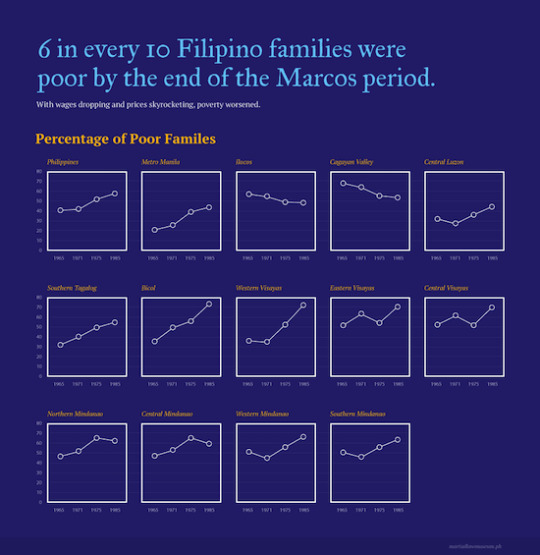
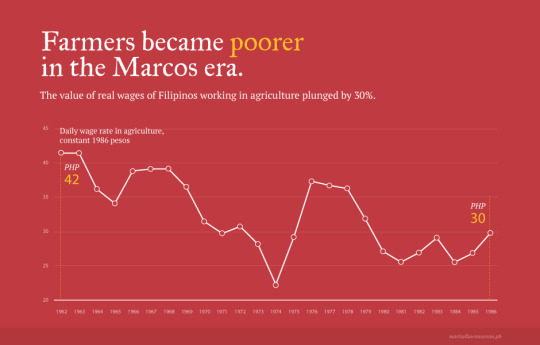

Info from images:
Poverty
Poverty worsened over the course of the Marcos era. Whereas about 4 out of 10 families were poor before Marcos took office, 6 out of 10 families were poor by the end of his rule.
Moreover, as the graph on the left shows, this is a consistent trend across the different regions of the nation, with some regions reaching as high a rate as 7 out of 10 families below the poverty line. Only two regions saw a marginal decrease in the number of poor families: the Ilocos Region and Cagayan Valley.
Daily wages of Filipino agricultural workers declined by about 30%, such that if a farmer earned Php 42 per day in 1972, he would only be earning about Php 30 in 1986. The wages of farmers even went as low as nearly half of the pre-Marcos values in 1974, right after the declaration of Martial Law (middle graph).
On the other hand, for skilled and unskilled workers in urban areas, the graph on the right shows the change in their wages from pre-Marcos to EDSA values. Skilled workers are workers with some special knowledge or skill, often having gone to college or technical school; unskilled workers are workers without this level of training.
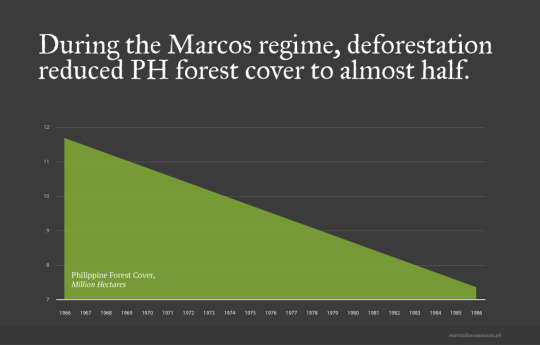
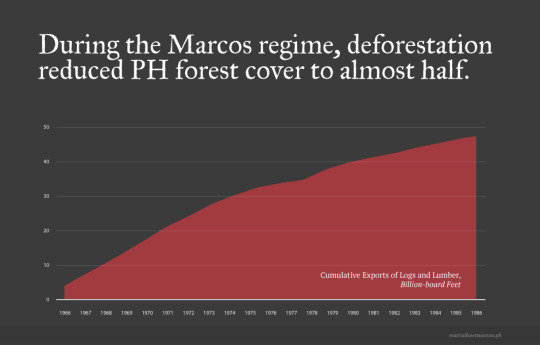
Info for images:
Deforestation
In addition to factors relating to the domestic economy, another way of assessing the Marcos regime is through its impacts on the nation’s natural resources and the environment. The graph specifically gives us an idea about how Marcos’s policies affected the country’s forest cover over the course of about 20 years.
Supposedly, about 90% of the Philippines’ 18.7 million hectares of uplands, including more than 11 million hectares officially classified as timberlands, is publicly owned. In practice, fewer than 200 individuals controlled a large fraction of the country’s forests.
In pursuit of economic gains, Marcos and his cronies’ uncontrolled exportation of timber led to a drastic reduction in forest cover. This cascades into dire environmental impacts including flooding, landslides, and even the worldwide phenomenon of global warming.
I could add more to this post, but that would be way too long.
To this day, the Marcos family, their allies, and supporters, paid or not, continue to deny these facts and claim that the Marcos family were good for the Filipino people and the country.
We must continue to remind the people of this dark time in the history, to not let history be erased and be replaced with lies, to remember the sacrifices made by the victims of Martial Law and their families, and to not let history repeat itself.
Never Forget!
Never Again!
sources:
https://philstarlife.com/news-and-views/649814-martial-law-by-the-numbers?page=6
https://martiallawmuseum.ph/magaral/martial-law-in-data/
https://newsinfo.inquirer.net/1167808/fast-facts-the-marcos-martial-law-regime
The Martial Law Museum and the Bantayog ng mga Bayani sites are good places to start reading more about this.
#Feel free to add more to this post bc i know theres way more#martial law#martial law anniversary#marcos#ferdinand marcos sr#philippines#philippine politics#bbm#bongbong marcos#ph politics#ph#ph history#history#politics#human rights#environment#historical revisionism#revisionism
23 notes
·
View notes
Text
Also, for everyone advocating for "anticapitalist degrowth" or whatever the shit.
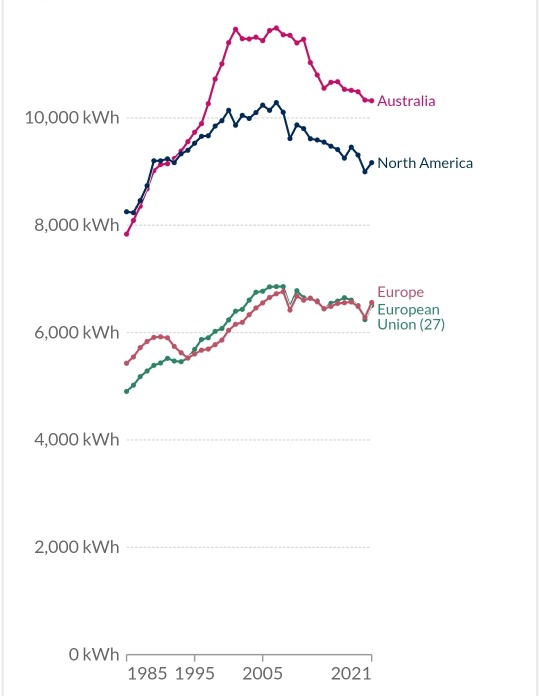
I guess it is already happening!
120 notes
·
View notes
Text
revolution in each country will be fundamentally different due to material conditions, and that means marxist revolutionary theory itself has to observe how its knowledge can be applied to it while developing knew solutions, not the revolutionary forces observing how much their actions apply to what Mao or Che or Lenin said. to think this is dogmatism, a form of “marxism” strong within revisionists.
9 notes
·
View notes
Text
The Revolutionary Analysis on the Non-Socialist “DPRK”
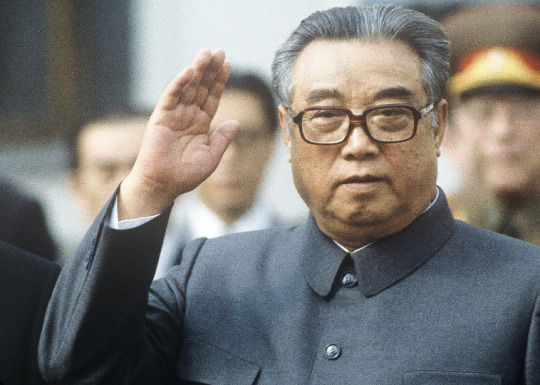
The Democratic People's Republic of Korea (DPRK), or North Korea, is often promoted as “already existing socialism” by so-called “Marxist-Leninists,” however, Marxist-Leninist Maoist theorists have a different view. The guiding principle of the country, Juche, which emphasizes self-reliance and independence, is seen by Maoists as a deviation from Marxist principles of collective ownership and control of the means of production. Maoists also argue that the state's emphasis on centralization and authoritarian control, as well as its monopoly on power and control over the means of production, is counter to the ideals of socialism and indicative of state capitalism, rather than socialism. Maoists believe that the development of socialism requires a revolutionary struggle and the establishment of democratic and participatory structures, which are currently lacking in the DPRK. According to the Norwegian Maoist media group Tjen Folket, Juche has little in common with Marxism. “Juche is idealistic and has a religious character. The leadership is not working to spread revolution in the rest of the world. It has a friendly relationship with Chinese state capitalism and was strongly against the Cultural Revolution in Mao’s time.”
The August Incident, which took place in 1956, marked a turning point in the Workers’ Party of Korea (WPK) and the Korean communist movement. The contradictions within the WPK reached a boiling point, resulting in the struggle between the left and right lines in the party. The Korean communist movement had its roots in the occupied Korean people's resistance against the expanding Japanese empire, with exiled Koreans joining the Communist Party of China. After World War II, the Soviet Union liberated the northern part of Korea while the US occupied the south, leading to the division of the country into a socialist north ruled by the WPK and a capitalist south ruled by the USA-backed Syngman Rhee.
Kim Il-Sung was elected chairman of the WPK a year before the Korean War and led a purge against the left line, which he saw as a threat. In 1956, Kim Il-Sung visited the Soviet Union and Eastern Europe with a state delegation, four months after Nikita Khrushchev’s secret speech where he broke with Stalin and Marxism-Leninism. The left line in the homeland attempted to address the right line's opportunism and revisionism, but they were outmaneuvered, purged, some even murdered. The August Incident solidified the right line's power and marked the end of the left line's influence in the WPK and the Korean communist movement.
Though Maoist organizations hold a critical line on Juche and the Workers Party of Korea, some Maoists acknowledge the positive developments in the DPRK in terms of addressing social welfare concerns and advancing the rights of workers. The state's efforts to provide universal healthcare and education and its focus on economic self-sufficiency are seen as steps towards socialism. They have also provided material support the National Democratic struggle in the Philippines. Some Maoists view the DPRK as a progressive state, but not a fully socialist one.
The August Incident marked a turning point in the WPK and the Korean communist movement, solidifying the right line's power and ending the left line's influence. The views of Maoist theorists and the troubling events of the August Incident reveal that the political and economic conditions of the DPRK are complicated, but that at the root of their government’s problems is the economic isolation forced on them by the United States. While Marxist-Leninist-Maoists view the country as a progressive state, they acknowledge that it still has a way to go in terms of fully achieving socialism.
#Syngman Rhee#workers' party of korea#communism#history#kim il sung#maoism#cultural revolution#marxism-leninism-maoism#nikita khrushchev#revisionism#theory#politics#marxism#juche#stalin#august incident#korean history#korea#north korea#dprk#democratic republic of korea#ideology#china#ussr
12 notes
·
View notes
Text
The State of Western Politic (or why I woke up pissed at 7 am on my day off)
I tend to get overtly pissy about CPUSA’s statement to “Vote out fascism” like that’s what antifascists have done in the past. You think the polls got Mussolini hung? You think ballots put that bullet in Hitler’s fucking head?
Like we are in between two stages of fascism according to George Jackson (I use his analysis because it isn’t as rigid a study as most academics would cling onto): ‘in power, but not secure’ and ‘in power and secure’. The rise of fascism in the mainstream has helped to vote in people who go beyond the alt right. And yes their statements are almost radical and anti-capitalist, but note that their critiques are aimed at changing liberal bourgeois democracy and limiting those freedoms to a specific sect of the capitalist class. They aren’t against capitalism but rather against the way capital operates.
Many in the global north have unfortunately fallen for their rhetoric because there isn’t any other alternative to the failures of neoliberal democracy both domestically and internationally. The deepening of the wage gap, the crumbling of health and living infrastructure, inflation and the like aren’t necessarily the best confidence builders. These decaying conditions, combined with the failure of international expansionism under the guise of ‘democracy’ to make for good nationalist propaganda, create a sense of loss in identity and desperation for mental and material stability. And in desperation people search for something else to make sense of the havoc (or coming havoc for those who have been spared from the last few years, I have a feeling this winter is going to be cruel and unforgiving). Some distract, which is unfortunately is an easy path into alt right pipelines thanks to useless mass media shoving brands and specific narratives depending on which sect of capital controls what. Tiktok’s algorithms go from kittens to why trans kids deserve to die in minutes (sometimes just to get you interacting and riled up, even if you are a transphobic piece of shit) and YouTube and Tumblr do not care about what is platformed as long as their stock numbers go up.
And this is where organizations like CPUSA and CPCanada fail to offer up a true revolutionary alternative. A word used in socialist spaces is ‘revisionist’, I would prefer to use cowardly. They tail the familiarity of liberal democracy, as if people aren’t moderately aware of the failures of the current system and are tired of being told to maintain it for the fear of the fascists coming in. The current material conditions created the fascist revival! Why the hell would you want to maintain the decay that brought this in the first place?!
We need to think *beyond* the current system and build up something better while we figure out how to tear the old. Lenin rightly criticized the social democrats in the Russian Tsarist government from going into reformist government and falling into the bureaucratic trap of the status quo, all to ‘preserve the state’. (There are more specific critique’s but this is getting long and I need lunch so here is State and Revolution Chapter 3)
We have a big job to do. The coming years are going to change things significantly. We don’t have time to waste on empty platitudes of maintaining status quo. We need to be revolutionary.
#socialism#Jackson Speaks!#jackson writes!#fascism#lenin#cpusa#cpcanada#cpc#revisionism#liberal#politic#politics#george jackson#democracy#writing#rants and rambles#but seriously I need mental help bc my eyes cracked open and I started beefing with CPUSA dudes#'voting out fascism'#my siblings in christ they wanna kill us
22 notes
·
View notes
Text

Reality Check for Feminists...
How many of you are aware that you all recycle the same responses, insults, and jaded talking points, whenever you clap back to men on social media making unflattering--but true--observations to negative female behaviors? Very rarely, will you any of you respond with a novel and rational counter-argument that men haven't heard before.
#Red-Pill#Feminist Lies#Feminine Narcissism#MGTOW#BMGTOW#Revisionism#Deflections#Dumb Bitch Logic#Anti-Feminism
3 notes
·
View notes
Text


Normal dms from my girlfriend
3 notes
·
View notes
Text
Here’s some advice.
Don’t EVER mock, belittle, degrade, or otherwise insult the victims of genocides, mass displacement, and other such atrocities.
That’s three drinks away from straight up denialism. And in some cases is a key component of it.
Don’t ever do that!
If you do so, you’re a fucking idiot at best and a dangerous fascist at worst.
#dougie rambles#personal stuff#belittling#bullying#mocking#famine#genocide#displacement#ethnic cleansing#atrocities#crimes against humanity#denialism#genocide denial#revisionism#anti denialism#history#political crap#fucking hell#shit takes#bad history#ignorance#vent post#enough of this shit
25 notes
·
View notes
Text

Cultural troops during the peoples war in Nepal (1996 - 2006)
The revolution was betrayed from within, the head of the capitulationist line being Prachanda. The tragedy is that this revolution progressed extremely fast and was this close to reaching its goal. Instead of erecting a bourgeois democracy the Maoists would have erected the dictatorship of the proletariat and started New Democracy, which would have laid the basis for socialist transition. Instead they are now as before caught in semifeudal, semicolonial relations and under the boot of imperialism. It is not clear why the revolution was betrayed. However the social democrats and revisionists have been using this defeat as a supposed success strory to try to convince revolutionary parties from laying down their arms.
There are forces within Nepal trying to restart the peoples war, but this time around it will be more difficult. The speed of progression of the last revolution was also due to the complete distrust the masses had in the monarchy (in the first bourgeois election they only received about 2% of the vote). Now with bourgeois democracy in place and the revisionists and open liberals having better means to deceive the people so any revolutionary attempt is not going be as quick and comparatively easy as before.
10 notes
·
View notes
Text
Ultra-left dogmatism and right-wing revisionism create and reinforce each other. Commandism and tailism create and reinforce each other. Centralist cults and ultra-democracies create and reinforce each other. To advance the struggle you must advance these contradictions, not just pick your favorite error.
#socialism#communism#Marxism#Marxist theory#democratic centralism#communist party#dialectical materialism#opportunism#dogmatism#revisionism#Marxism-Leninism#Maoism#Trotskyism#Left-Communism#commandism#tailism
14 notes
·
View notes
Text
@mourning-again-in-america This is the historical joke I was attempting to make, which I have learned to my alarm does not actually come up when you search for "Bogus Island"?


I mean, my Teamster friend IRL knew this off the top of his head. And not only do none of the results mention Pinkerton, the only result that mentions the arrest as occasion for the name of the island is off by ten years. I let it go when I asked ChatGPT about Frederick Seward, but now I have to wonder...
2 notes
·
View notes
Photo

“Down With Revisionism!” graffiti, abandoned laundry building, November 2021
3 notes
·
View notes
Link
What really happened?
0 notes